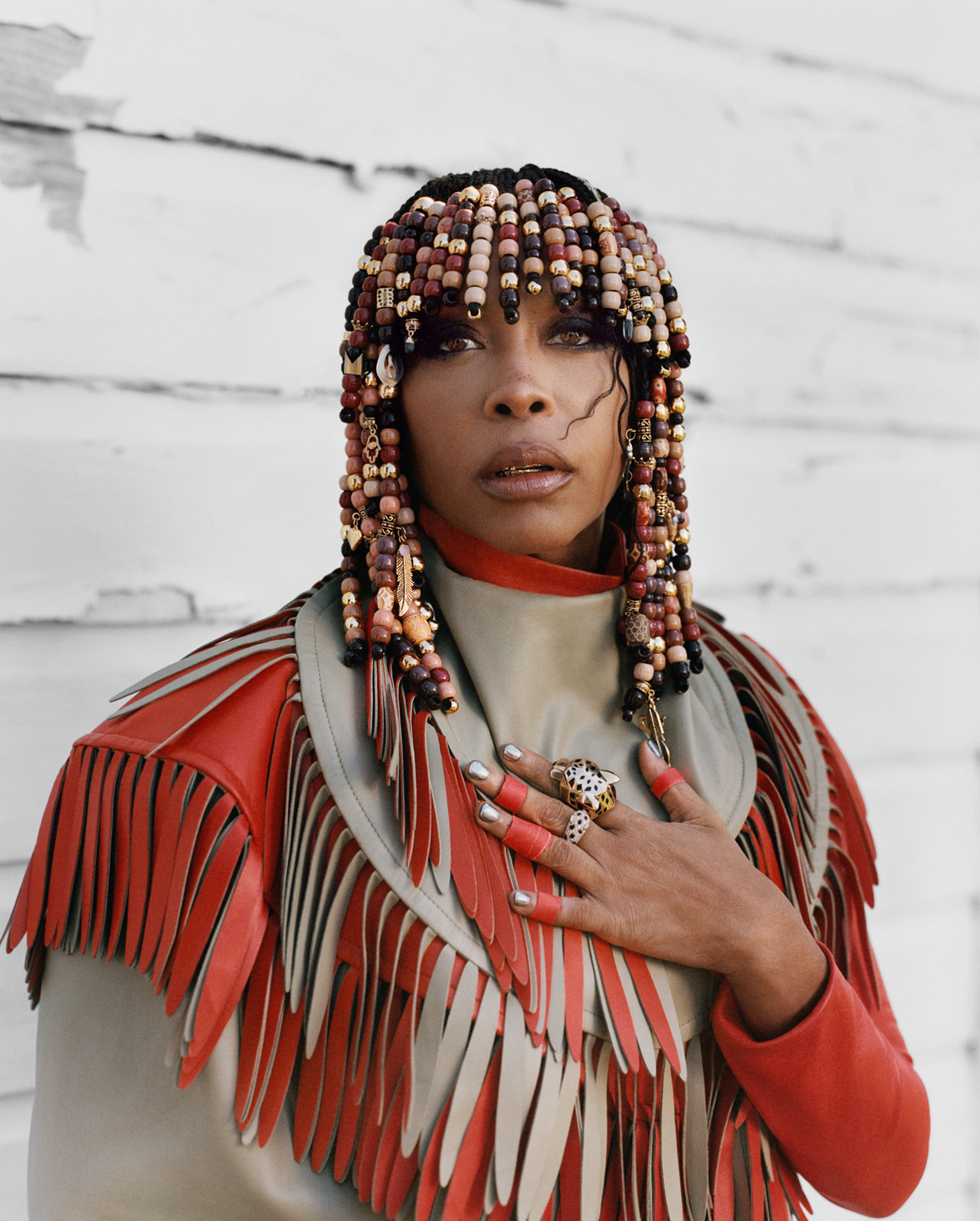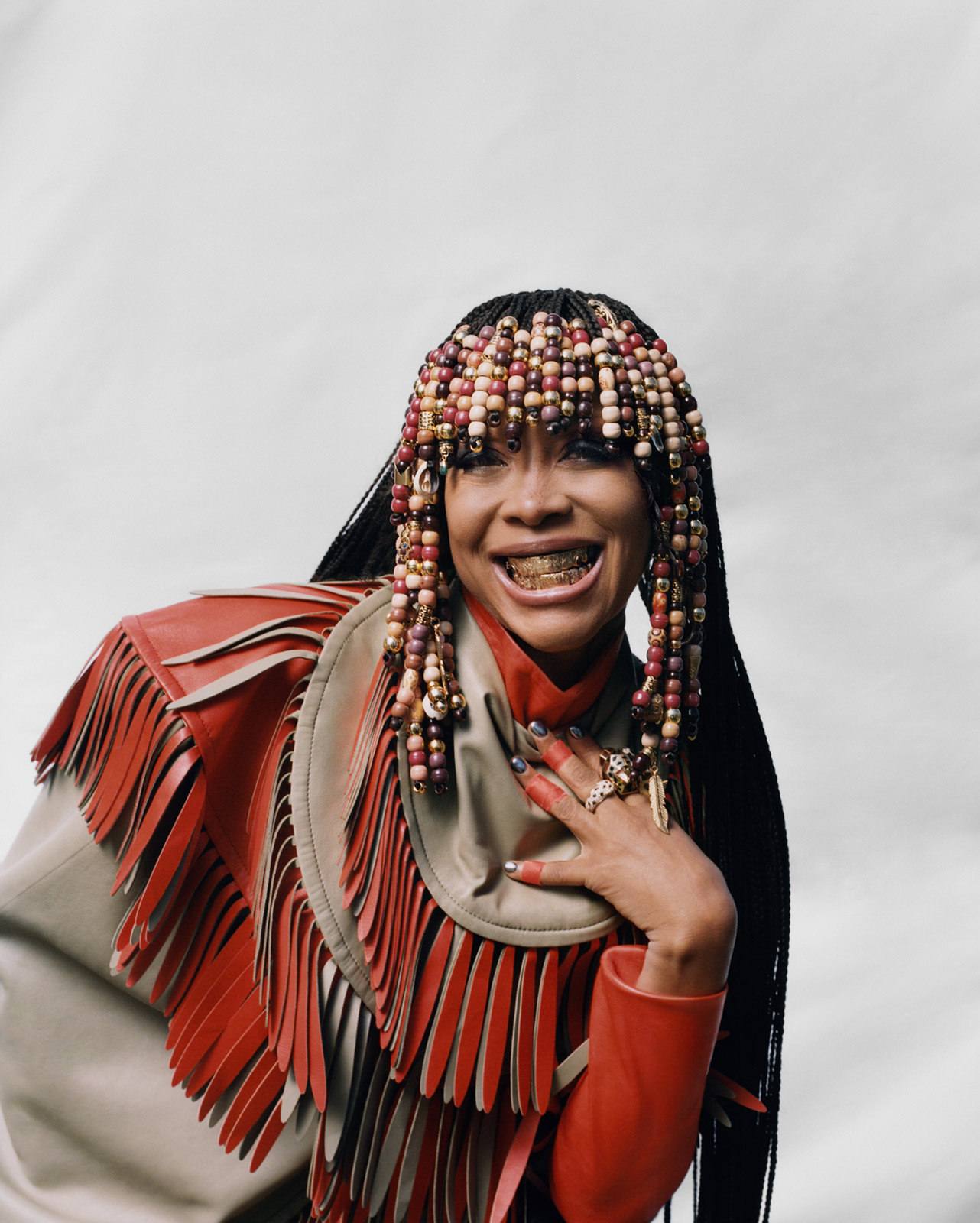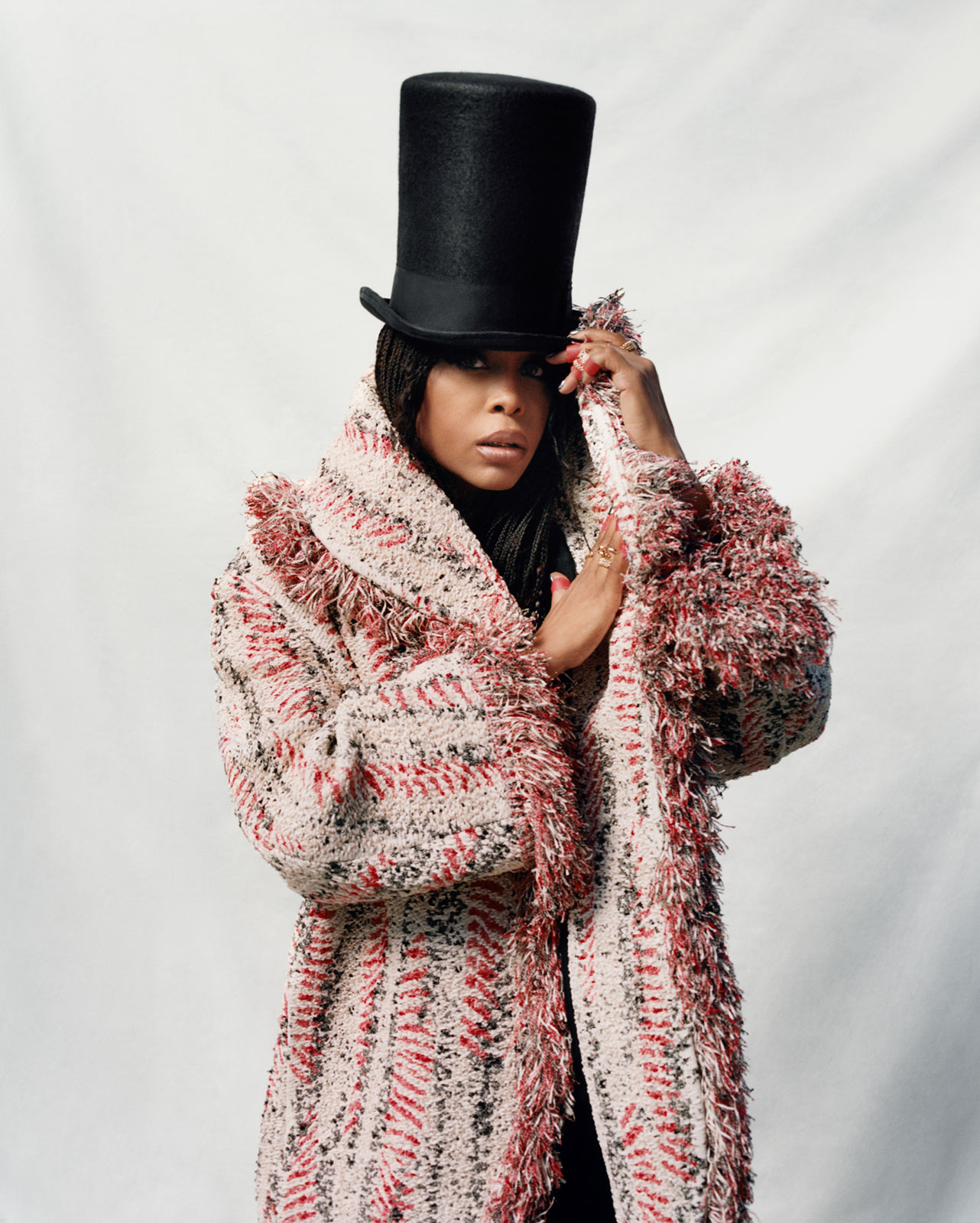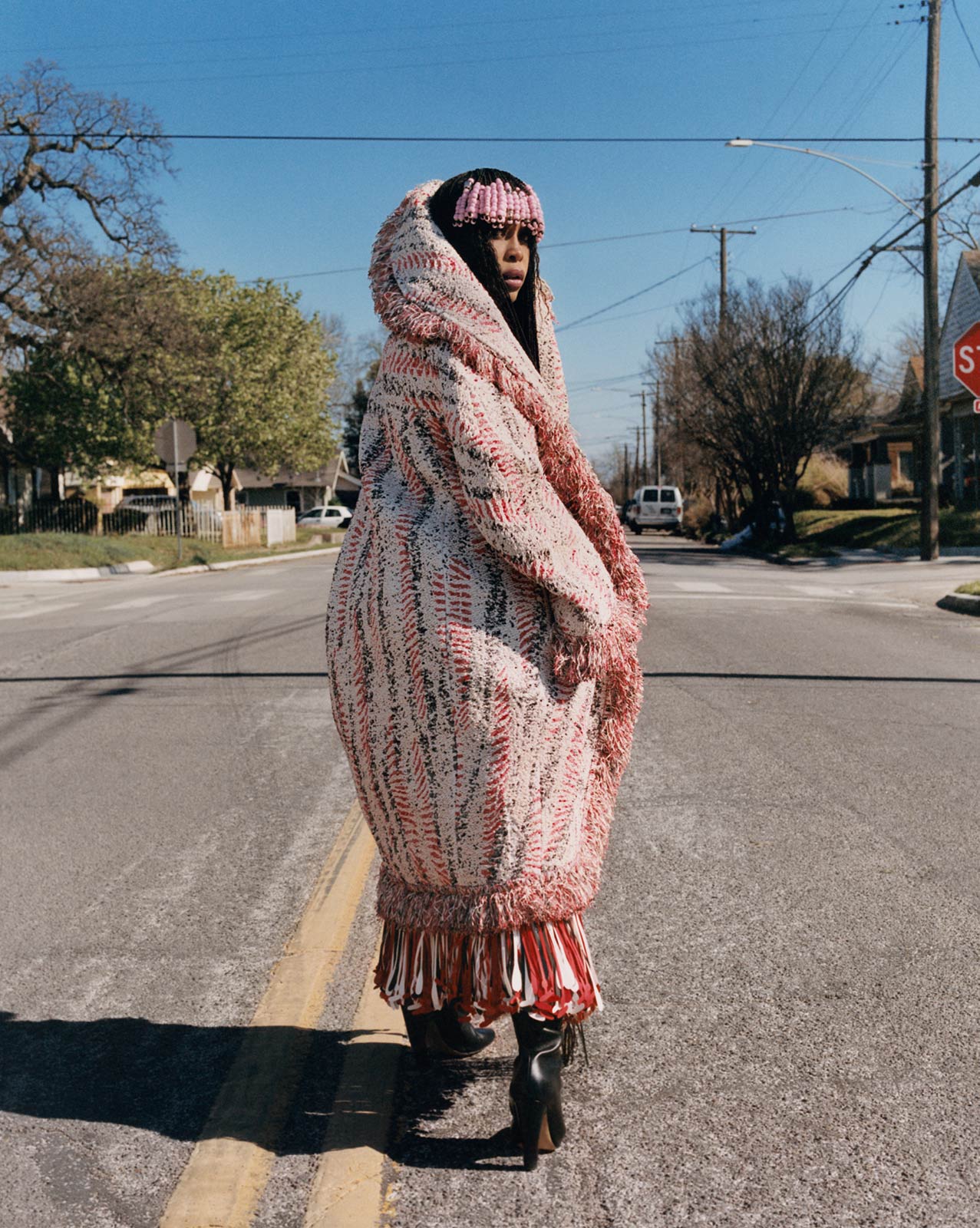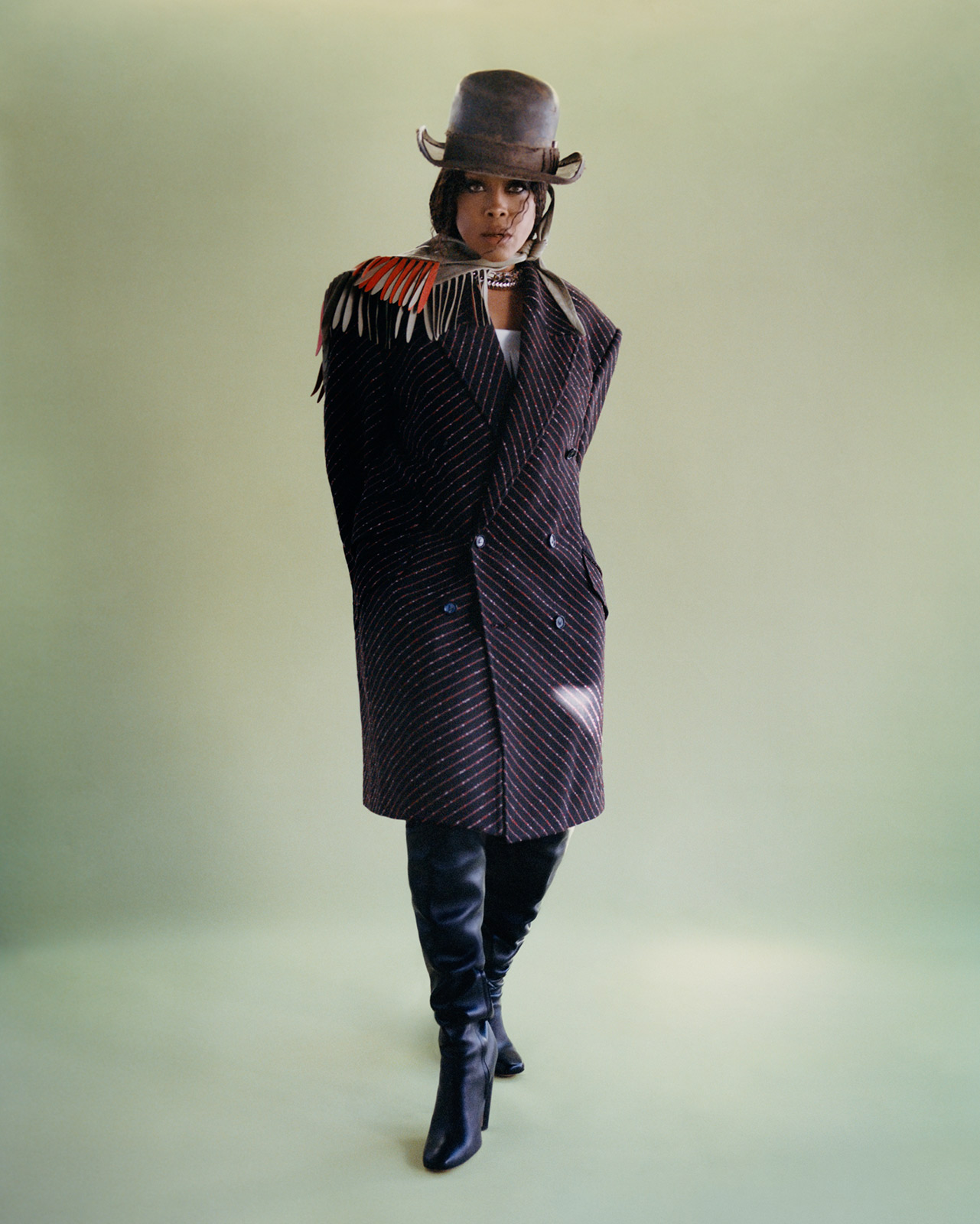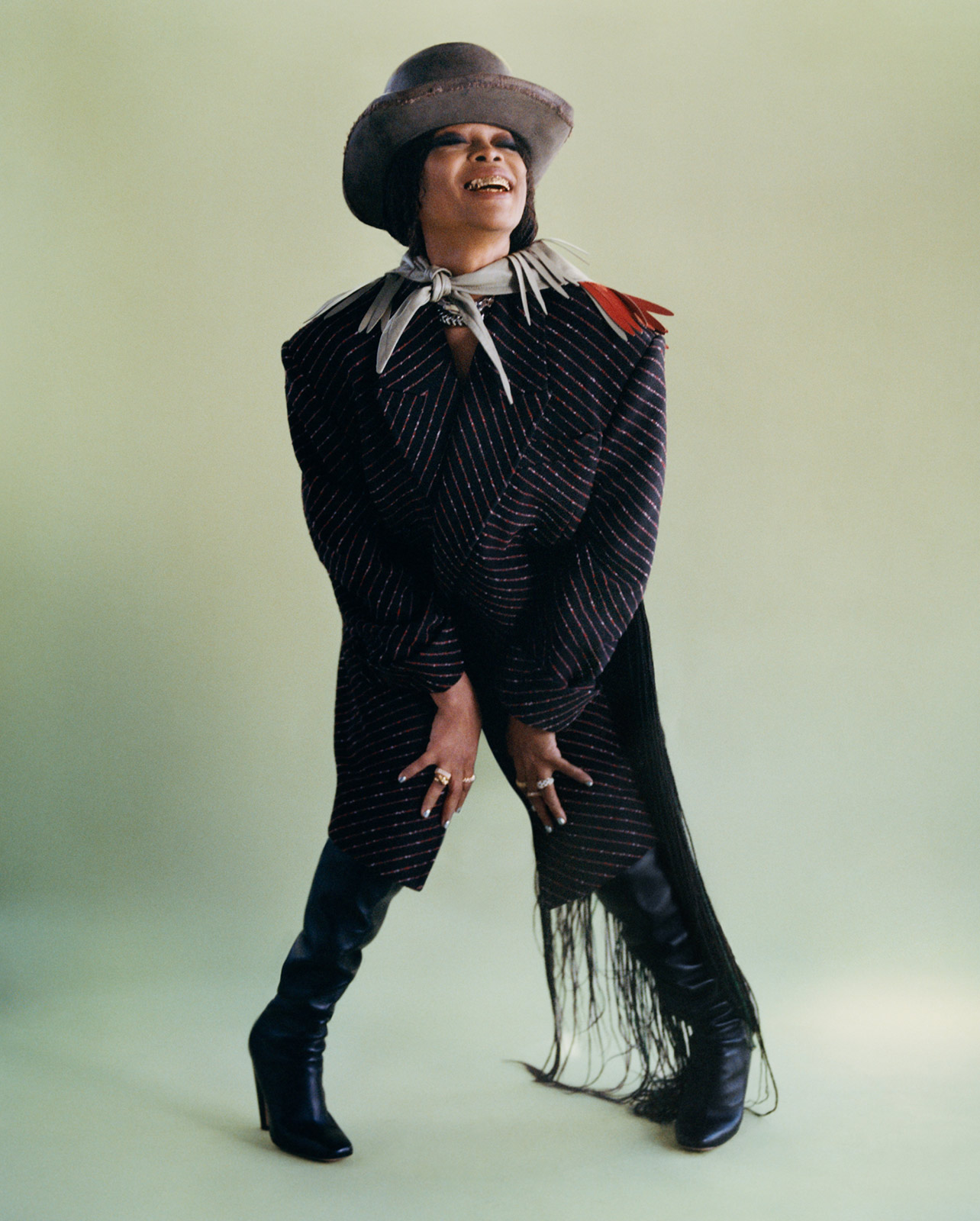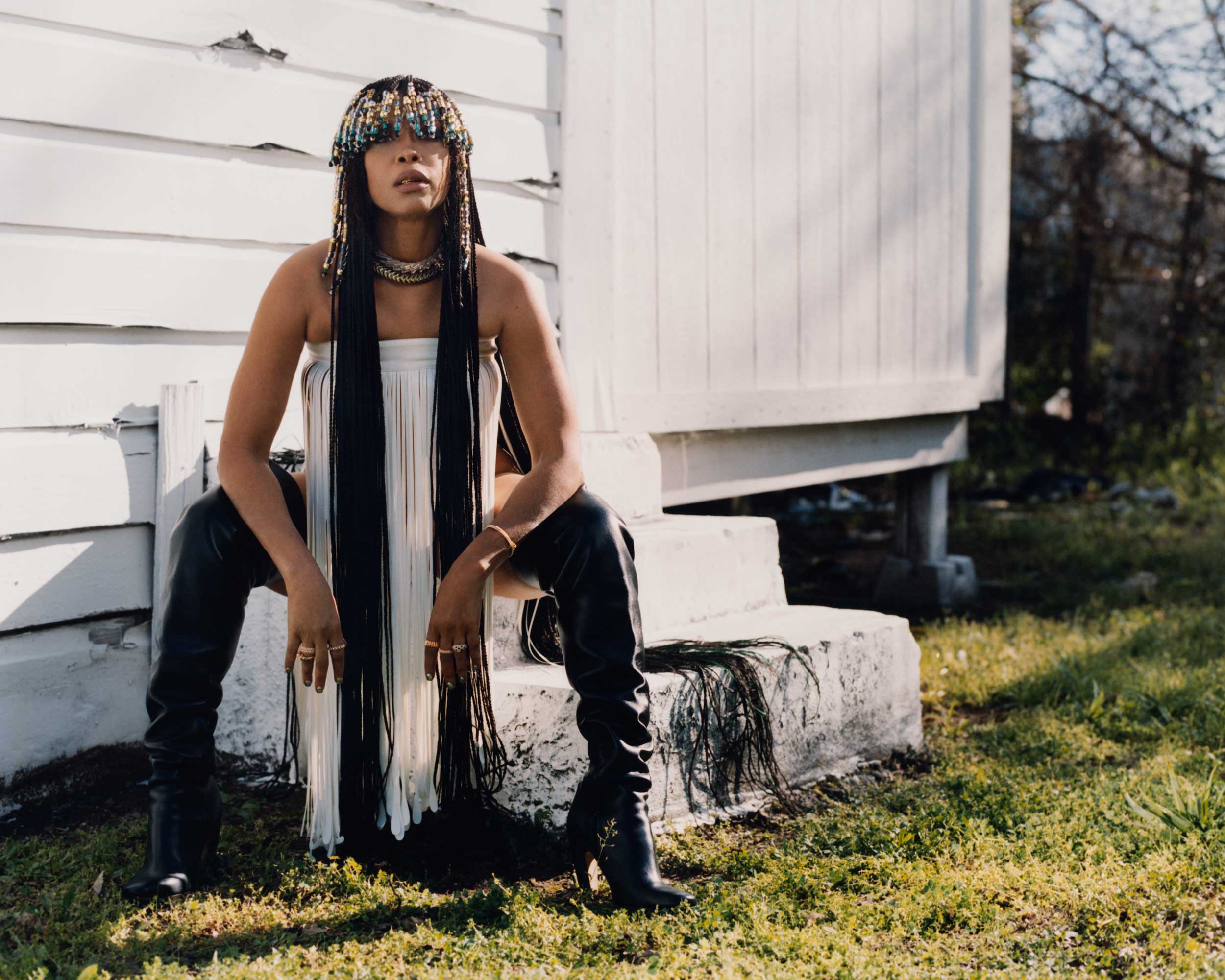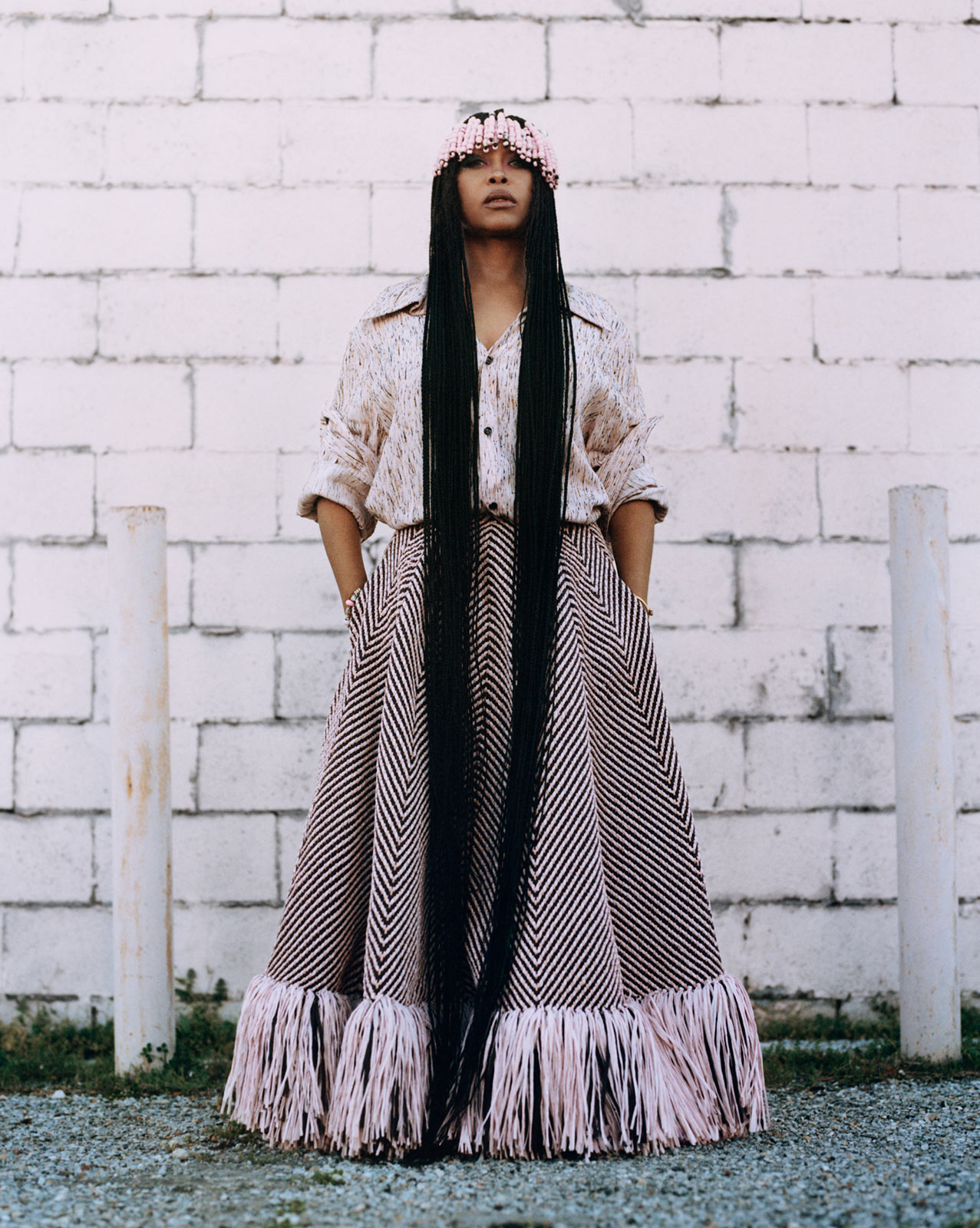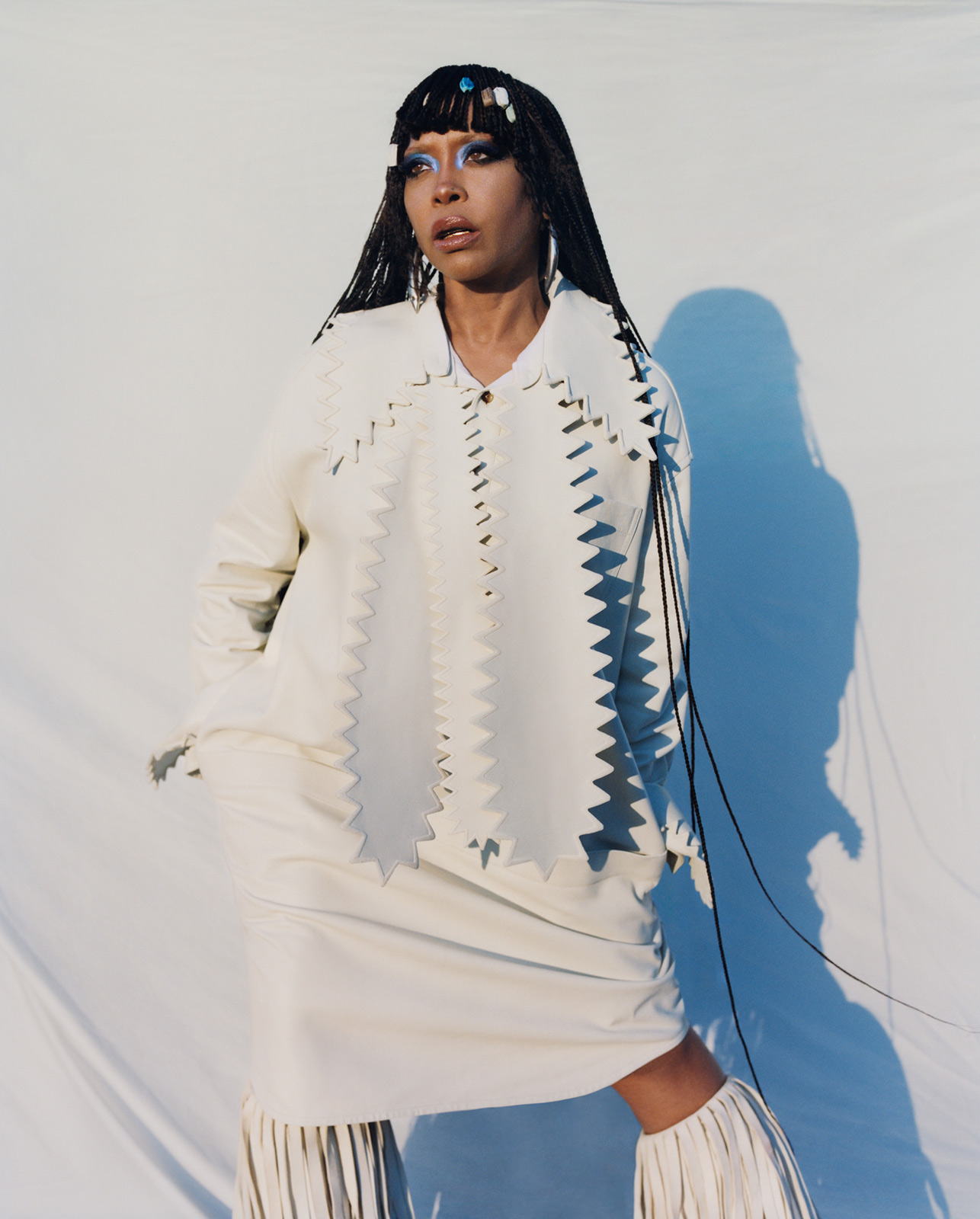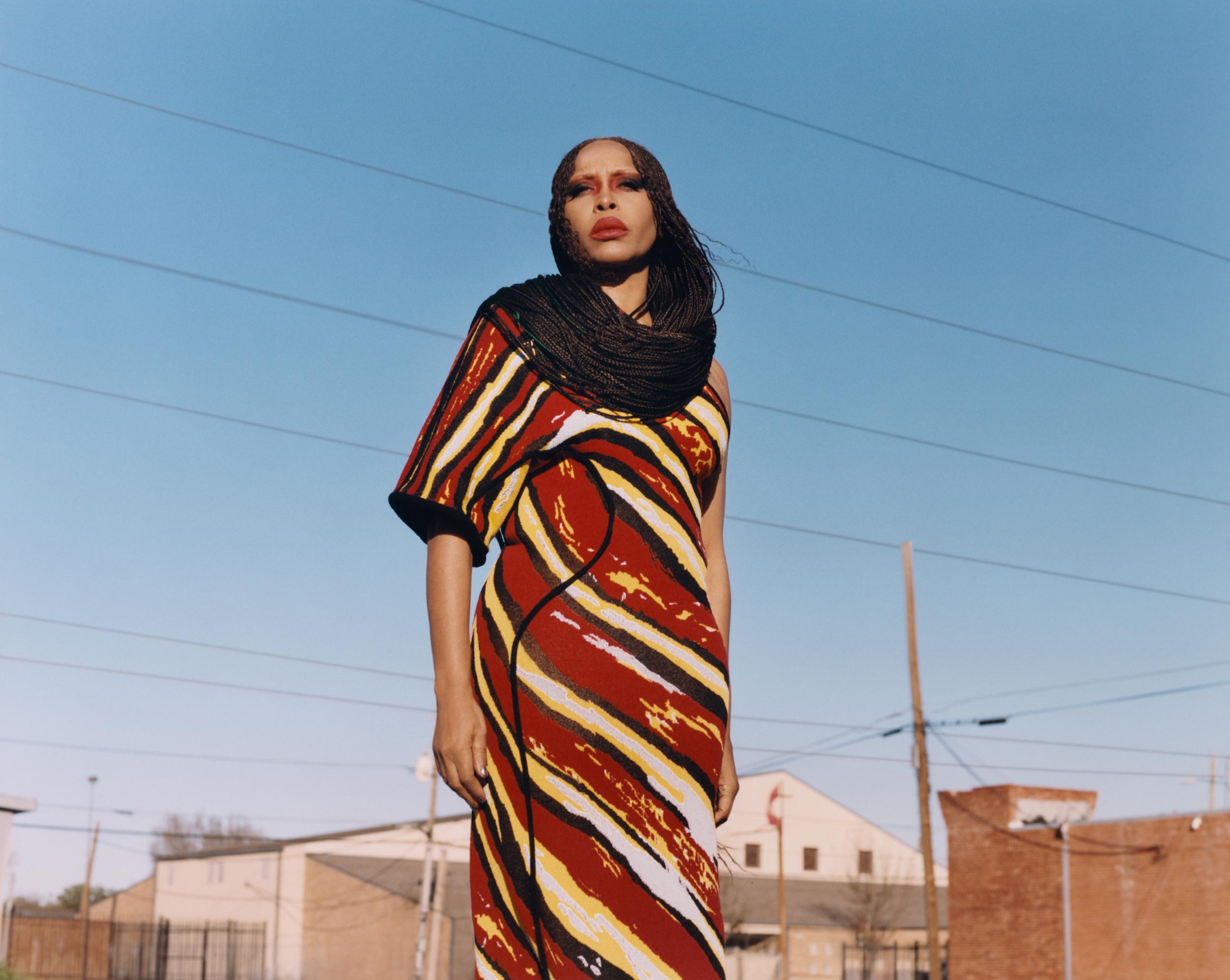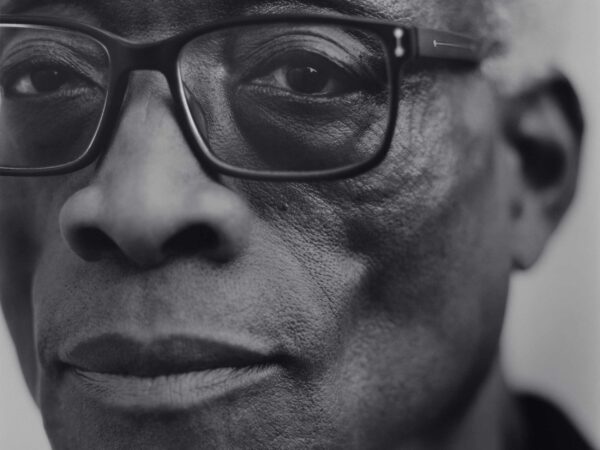The musician and designer participate in a visionary mind meld for Document’s Spring/Summer 2024 issue, addressing everything from artistic truth-telling to their gold teeth
Rumor has it that Erykah Badu possesses powers of extrasensory perception; that simply looking in her eyes makes people fall in love; that her pussy “changes men”; and that, in a past life, she walked the Earth as Jesus Christ. Just as many myths surround Michèle Lamy: Some claim that she is from a Bedouin tribe; that she was raised by wolves; that she was born in a resistance camp in occupied France; or that she’s a 1,600-year-old witch, kept alive by black magic. In reality, she just turned 80, though that hardly matters: “I don’t feel it,” she tells Badu, blowing puffs of cigarette smoke into the camera from her Paris home. Seeing her on Zoom, it’s obvious why her life partner and creative collaborator, Rick Owens, calls Lamy a “mesmerizing sphinx.” With her kohl-rimmed eyes and Berber-inspired tattoos, one can imagine her posing a clever riddle or conjuring visions from the future—but in conversation with Badu, she’s more interested in understanding the enduring drive behind the latter’s prolific, three-decade career.
Among the most recognizable faces in music and the “High Priestess of Neo-Soul,” Badu took the world by storm with her first album Baduizm: a fusion of R&B, hip hop, and soul that went on to win two Grammys, three platinum plaques, and four Soul Train Music Awards, launching her into the spotlight at the age of 25. But that was only the beginning: With her jazzy, funk-influenced sound and inimitable stage presence, Badu “cut through like a knife in one of the darkest times,” in the words of American rapper Terrace Martin, taking on social causes affecting the Black community and bringing antiracist thought into the musical mainstream. (The term “stay woke,” though used by Black thinkers as early as the 1930s, was popularized by Badu in 2008’s “Master Teacher” as a contemporary call to action.) Following the chart-topping success of her 1997 debut, Badu released four acclaimed studio albums, weaving spiritual, philosophical, and political topics into an expansive sonic universe that “disrupted some theory that [people] had memorized,” creating a ripple felt across the industry. “I was doing something that was not comfortable,” she recalls. “I believe, as an artist, my job is to just tell the truth. Sometimes the truth hurts, but the pain is necessary, like labor pains. Eventually, something is born of it.”
Known to many as “Badoula,” she is intimately familiar with the birthing process, having assisted in the labor of people from all walks of life—from fellow celebrities Teyana Taylor and Slick Woods to relatives, magazine editors, and, once, a woman she met at Whole Foods. That Badu’s presence would help someone bring a new life into the world is no surprise: “You are one of those people with a spirit that just communicates,” Lamy says. “When you appear, it’s like, Erykah Badu is here. Everyone thinks something will happen, that they will feel better, that they will encounter something that makes them create, that makes them think another way, that will open their minds.”
Lamy knows a thing or two about self-transformation. In her 20s, she was a criminal defense lawyer and a student of the philosopher Gilles Deleuze; then she learned the art of the striptease, worked in a cabaret, and absconded to live in New York’s Chelsea Hotel before going on to become a clothing designer, film producer, restaurateur, musician, and perfumer whose career eludes the limits of genre. These days, Lamy can be found overseeing the design and production of furniture at Owenscorp, or traveling the world to foster collaborations with the likes of musician FKA twigs—that is, when she’s not busy beating her opponents in the boxing ring, a hobby she shares with Badu.
After years of pursuing each other, the pair sit down with Document to discuss truth-telling through creativity, the meaning behind their gold teeth, and the role of the artist in today’s society.
“Inside of me, I have so many different types of Indigenous culture and memories of art. And that is what I am—the walking memory of my creative ancestors.”
Michèle Lamy: It’s so good we found a way to talk. I admire you so much and I feel we have the same spirit, but usually we pass by each other.
Erykah Badu: I feel the same way. For years, people would ask me, ‘Do you know Michèle Lamy? You seem like you’re from the same tribe as her.’ So I’ve always wanted to find you, to talk to you, to spend time with you. I was always trying to figure out, Why am I drawn to Michèle? And I’m like, Maybe it’s a past life. Because I can relate to your voice. I remember it. Whenever I hear you speak, it vibrates this part of my body.
Michèle: I have always felt genes have memory.
Erykah: Yes. I’m five generations of Dallas [Texas]. My family
is African and Native American. Our Native American tribe is called Choctaw. In the 1800s, my tribe took in a lot of African Americans who were freed slaves. So we mixed. Inside of me, I have so many different types of Indigenous culture and memories of art. And that is what I am—the walking memory of creative ancestors, of my family.
Michèle: I think we have this in common; we feel we are one link in the chain. Another thing we have in common is we feel like everywhere we are, we belong.
Oh, here is Rick Owens coming to say hi.
Rick Owens: Hello Erykah. It’s nice to see your face.
Erykah: It’s nice to see yours. I miss you guys.
Rick: I’ve been missing you, too.
Erykah: I’ve been to your house, and I have to say, everybody in the fashion world wants to be your friend! Seeing you hosting, everybody wants to be seen by you, be heard by you. And it’s because you have such a huge presence. You don’t have to do much, you just wake up and are the art. How does that make you feel that so many people want to feel your energy?
Michèle: People are always talking about energy. Me, I don’t really think about this. But with you, what is fantastic is beyond the music… When you appear, it’s like, Erykah Badu is here. Everyone thinks something will happen, that people will feel better, that they will encounter something that makes them create, that makes them think another way, that will open their minds. People think, let’s follow her. Let’s get a little bit of her spirit.
Erykah: You know Michèle, I come from a culture called hip hop—a place for [Black people] to create and be resilient and be right. It was our politics, it was our voice. And one of the principles of hip hop is no biting. Do you know what biting means? It means ‘I’m creating something to inspire you, not for you to copy.’ For many years, I had trouble with creating something, and then someone else doing the same thing. People say, ‘You should be flattered.’ I’m not flattered. And you’re so unbothered by that, it helps me to know that whatever you create doesn’t really belong to you. It belongs to the world now. Your presence showed me that.
Michèle: This is a question of seduction of the mind. Your presence is a lot of seduction, all those creative people are attracted to you because they think they are getting some of your vibe.
Erykah: That’s what it looks like with you! Seeing you hosting reminded me of me in my space, only I’m trying to run away from people—and when I feel people pulling and needing something from me really badly, I want to go to another area. I remember we shared a smoke at your house, and I sat there with you and I felt at home. When I’m with you, it’s like we don’t have to talk about our past or talk about who we are. We just hold the same space.
“As an artist, my job is to just tell the truth. Sometimes the truth hurts, but the pain is necessary, like labor pains. Eventually, something is born of it.”
Michèle: You are one of those people with a spirit that just communicates. And right now, it’s very difficult to get the spirit going. I could not believe that I live in a time that is so difficult, that is so horrible. Before the internet, people would see an image of a concentration camp and they couldn’t stand it. And now, under our eyes, the worst things in the world are happening, and we are useless. Most of the world did not know where Palestine was.
I think, Erykah, that you have a huge influence because it’s people like you who make others start thinking outside what is always said and done. You have an image, a voice, a soul that just needs to show up—and then people say, ‘Hey, wait a second. What have we been doing? What have we been thinking?’
Erykah: The lower vibration recognizes that it’s coming to an end—the way they are programming us, the lessons that the school gives us, the little things that they don’t teach us and tell us. The gatekeepers are dying, and we are coming forward.
Camille Sojit Pejcha: What do you see as the artist’s role in bringing about this cultural shift?
Erykah: I believe, as an artist, my job is to just tell the truth. The truth to me is the thing that dissolves the matrix. It destroys the fourth wall. Sometimes the truth hurts, but the pain is necessary, like labor pains. Eventually, something is born of it if you tell the truth in art and are just honest about who you are as an expression. It’s the only thing that can free us.
Michèle: When did you realize that people were looking at you in a different way—that you were making them change their world?
Erykah: I knew through people’s responses to me that I was doing something that was not comfortable, that disrupted the structure of things. It disrupted some theory that they had memorized. And it felt lonely, at first.
Michèle: You felt lonely. But then did that not change you at all?
Erykah: I can’t do anything but me. I don’t know how to be anything different. I just don’t like how I feel when I lie to myself. So I’d rather be lonely. And I’d rather be with my mind, because the way I manifest things is by using my creative imagination. It’s my imagination that keeps me from being angry or dismissive of everything and everyone, because I’m able to discern between what thoughts are fruitful and which thoughts don’t help anything at all. When I think bad about myself, I snap out of it quick. I’m 53, and I’m able, at this age, to turn the channel in my mind to say, Oh, that’s not necessary. I can take this thought and put it into another place, and I can keep creating and dreaming.
Now, in 2024, everyone is excited about creating and dreaming. Sometimes I feel I might get lost in all of these images that I’m seeing. So I have to turn off the internet. I have to turn off social media to go be by myself and imagine. And then I turn it back on, and if I see someone else who is similar, then I know that we are on the same wavelength of art. They start to inspire me, like you. I turned all the channels off one time, and when I turned them back on, I saw you.
Michèle: Do you feel you need collaboration to create?
Erykah: I’m a performance artist. I like to be on stage. I like to feel the immediate energy of the audience. I like to ebb and flow with their mood. I like to feel that I can’t leave the stage until I have penetrated the walls in the place. It’s where I feel good and happy; I feel like I’ve finally been put in the right plug, and now I can shine. It’s where I’m supposed to be.
Michèle: That’s where you are supposed to be—we don’t need just to listen to your music, we need to see you. And then you feel you are at home, you are creating your world, and you are taking people in.
Erykah: And they’re welcome to be there. I never underestimate the audience’s ability to deem my truth relevant to them, especially when they are in the same space with me. Sometimes it’s hard to penetrate, but my life’s work is with that stage—and if it makes me feel good, I can imagine that other people feel good too. And if it inspires them in some way to go and create, then I’m imagining that they’re taking a little bit of that with them. So I feel I’m useful in the world. I’m not very useful at a party because I’m shy, I want to not talk. But I’m useful on the stage. I’m not useful in the classroom, because I’m not great at math. But I’m useful on stage.
Michèle: Everybody right now needs you more than ever on the stage.
Erykah: Thank you for reminding me. Have you been to my show before?
Michèle: No.
Erykah: I want you to. That’s how I think we are gonna really know each other, because that’s how I talk. I’m gonna invite you personally next time, okay? And I’m going to send my plane to get you.
Michèle: Oh yeah?
Erykah: Yes. I don’t have a plane, but when I get one… [Laughs]
I just remembered I saw you on Instagram boxing before. It’s my favorite thing to box. I have a lot of tomboy in me. Do you still like to practice boxing?
Michèle: I’ve been fighting for a while, and I’m still doing it. There is something about looking people in the eyes when you are in a ring. It’s like dancing—because you have to escape.
In New York they do something called punk boxing at Overthrow. Before each match, they say, ‘What are we fighting for?’ That’s my motto also.
Erykah: I like it. Maybe we should do a collection based on boxing.
Michèle: Yes.
Erykah: Would you be in my video? Will you help me write it? Direct it? I want to do a movie with you.
Michèle: Okay, so when are we doing it? I am 80, so now I am going to drag you into doing something soon!
Erykah: I cannot believe you’re 80!
Michèle: I am 80, but I don’t feel it.
Erykah: You take the lead. I know you have a lot of stories to tell.
Michèle: You are doing the music and I’m making this story for the video. Perhaps we go someplace else. It’s not going to be in Dallas. And it’s of course not going to be in Paris.
Erykah: Morocco.
Michèle: We’re doing it in Morocco.
Erykah: I’ll meet you there.
Michèle: Voilà! If it is written in Document, we’re sure we are doing it.
Erykah: It’s gonna happen.
Michèle: Inshallah.
Erykah: Can I ask you something? When I knew I was gonna talk to you, I had five questions in my mind, and they’re very simple questions.
Michèle: Tell me.
Erykah: Okay, who is the cutest rapper in hip hop to you?
Michèle: The cutest? A$AP Rocky. Next question.
Erykah: My next question is: Why did you get permanent gold teeth? For you, what is the symbolism of it?
Michèle: It started because when I was living in LA they said that my filling was mercury and we had to take it out. This holistic dentist replaced it with gold. And then I thought, Shit, I spent all this money to do this and you cannot see it! So I started with one gold tooth in the front. And then I continued because they said, ‘Why not do this one? And how about this one?’
I had good teeth in the front, but I smoke and drink tea all the time—so I thought, It’s better to be bad! At the time I did this, I didn’t know anybody else wearing it. It was coming from something a lot more ancient. I saw those mummies in Egypt, their teeth were tied up with gold. It came out of a lot of things. It just happened… but it was not an accident. I needed to do it. And so now it’s my best accessory. I have rings, I have many little teeth. I have one you cannot see with rock crystal in it.
[Michèle shows Erykah the inside of her mouth.]
Erykah: That’s absolutely incredible. Do you know why? Because that’s the same reason I did mine. Look, I started back here.
[Erykah shows Michèle the inside of her mouth.]
It’s the same thing. I wanted the mercury out of my head. And I replaced it with gold.
Michèle: Yes. That’s exactly the same story.
Erykah: I’m so happy I asked you that. That’s another confirmation we are from the same tribe.
Okay, next question. I’m 53, and when I turned 50, my whole body changed. I have no more periods, and for some reason now I’m stronger than I’ve ever been before. My muscle strength is different, and I am able to endure more force and work. Did this change for you? It’s like one thing is taken away, but you’re given the gift of some superpower.
Michèle: I have one daughter. It’s like a miracle. But I always thought that those period things were not me. I’m from the first generation of women who could decide if they wanted to have their periods or not because of the pill. I always say that I was lucky because there was novocaine for the teeth and the pill for periods—we can decide to have it or not.
Erykah: I feel like I’m in the best shape of my life, the best skin, the best everything. Like I’m back in high school, but I know more, or something. Like a queen-ager. [Laughs]
Michèle: So I’m the queen mother. We are the same way.
Erykah: Next question: You were a model before, right?
“I took some pictures, but I never thought the word ‘model’ was right. It’s more like showing up and saying, ‘This is what I have to say.’”
Michèle: No, I never walked as a model. I was always with the underdogs, so when I was in Paris, I started to do some striptease at the little fair around Paris with a girlfriend of mine who was trans. The thing is, now that seems to be new, but I was always with people like this already in Paris. I never liked the heterosexual men. I like gender to be mixed up.
Erykah: Fluid.
Michèle: Yes. Fluid is the word. We are all fluid, my dear.
Erykah: So you never modeled.
Michèle: I mean, I modeled one time for Rick not so long ago. I like to make stories. So of course I took some pictures, but I never thought the word ‘model’ was right. I think it’s like you: You are not a model for someone or something, advertising a style. It’s more like showing up and saying, ‘This is what I have to say.’
Erykah: This is my next question: Is there some work inside of you that you have not been able to get out just yet, that you still want to share with us?
Michèle: I’m sure that there is. Right now, it’s all about creating and discovering spaces, designing spaces, and making them belong to you. That’s what I’m continuing to do. The next thing you will get out of me is that invitation to Morocco—so I did not get it out yet, but it’s coming soon, and you are going to see! I don’t dream of going to the moon or whatever. I want to be with the right people, and think we have made a mark. And there is something about women who are witches… This is the kind of spirit that every hopeful civilization should have.
Erykah: I share that with you.
Okay, my last question is not very important—but do you like cereal with milk or without milk?
Michèle: I don’t like cereal, point.
Erykah: You don’t like cereal, period?
Michèle: Yes. I don’t like cereal, period.
Erykah: That was all my questions.
Michèle: I’m so flabbergasted that we could have this encounter. I like it when we see the road is continuing. There was a reason that we were talking to each other because we are collaborating, and now I cannot wait because it’s going to be great. And it has to be fast, because I am 80.
Erykah: I can’t believe it either. We had to have this interview for us to make this plan. Thank you so much, Document!
Michèle: Alright Erykah, goodbye till tomorrow. I’m going to pursue you. Even if I have to go to Dallas to pick you up. Voilà!
Erykah: I’m so happy that I’m on the same planet at the same time with you on this timeline. I love you.
Michèle: I love you more.
Creative Consultant Erykah Badu. Make-up Puma Curry. Manicure Taliysha Lenoir. Tailor Jane Sublet. Photo Assistants Zack Forsyth, Alex Morgan, Lo Kueheier. Stylist Assistants Jody Bain, Courtney Williams. Production Director Wes Olson at Connect The Dots Inc. Production Coordinator Nicole Morra. Production Assistants Nico Robledo, Khari Cousins.



